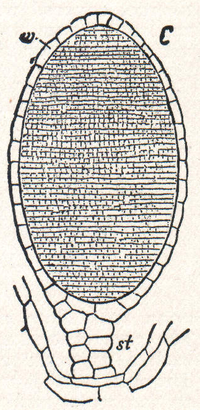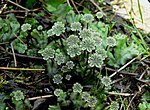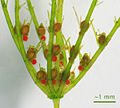Antheridium (redirect from Antheridia)
antherozoids or sperm). The plural form is antheridia, and a structure containing one or more antheridia is called an androecium. Androecium is also...
4 KB (401 words) - 02:22, 1 October 2024
antheridia and archegonia occur on the same plant and those in which they occur on different plants. The term monoicous may be used where antheridia and...
35 KB (3,518 words) - 08:15, 29 October 2024
(producing antheridia and hence sperm) or female (producing archegonia and hence egg cells). Monoicous: each individual gametophyte produces both antheridia and...
17 KB (1,655 words) - 18:04, 19 June 2024
monoecious species, the antheridia and oogonia are always found on the same filament. In macrandous dioecious species, the antheridia and oogonia are produced...
64 KB (6,295 words) - 04:35, 3 March 2024
away from the antheridia, which are normally produced on the top side of the thallus, and swim in the film of water to the antheridia where they fertilize...
26 KB (3,245 words) - 02:29, 28 September 2024
Haploid gametes are produced in antheridia (male) and archegonia (female) by mitosis. The sperm released from the antheridia respond to chemicals released...
39 KB (4,831 words) - 14:41, 2 November 2024
The sex organs of the green algae Chara are the male antheridia (red) and female archegonia (brown)...
20 KB (1,995 words) - 02:30, 9 November 2024
sperm-producing ones are called antheridia (singular antheridium) and the egg-producing ones archegonia (singular archegonium). Antheridia and archegonia occur on...
40 KB (4,576 words) - 18:28, 23 October 2024
gametangia are most commonly called antheridia. They produce sperm cells that they release for fertilization. Antheridia producing non-motile sperm (spermatia)...
3 KB (313 words) - 22:21, 3 November 2024
organs. The male organs are known as antheridia (singular: antheridium) and produce the sperm cells. Clusters of antheridia are enclosed by a protective layer...
41 KB (4,223 words) - 06:20, 8 November 2024
(venter) down which the male sperm swim. The male organs are known as antheridia (sing. antheridium) and are enclosed by modified leaves called the perigonium...
61 KB (6,979 words) - 08:33, 19 October 2024
involves sperm from antheridia on the male plant fertilizing an ovum (egg cell) in the archegonium of a female plant. The antheridia and archegonia are...
4 KB (367 words) - 18:26, 26 October 2024
reproduction of an oospore is the result of contact between hyphae of male antheridia and female oogonia; these spores can overwinter and are known as resting...
21 KB (1,677 words) - 19:29, 28 October 2024
3–10 mm long and 2–8 mm broad. The prothallus produces gametes by means of: Antheridia: Small spherical structures that produce flagellate sperm. Archegonia:...
60 KB (5,789 words) - 01:42, 23 October 2024
contrast to the male antheridia which are elongate and contain several nuclei. In heterothallic species, the oogonia and antheridia are located on hyphal...
16 KB (1,945 words) - 14:33, 12 February 2024
in algal and many plant gametophytes are produced in male gametangia (antheridia) via mitotic division. In flowering plants, sperm nuclei are produced...
30 KB (3,401 words) - 06:05, 28 May 2024
radiating arms of female gametophores (left) protect archegonia that produce eggs. Male gametophores (right) are topped with antheridia that produce sperm....
29 KB (2,959 words) - 21:44, 29 October 2024
tissue of considerable size, and bears both the male and female organs (antheridia and archegonia). They are more commonly distributed vegetatively, though...
9 KB (920 words) - 11:21, 18 September 2024
water, mineral nutrients and nitrogen. Antheridia and archegonia are often clustered. A cluster of antheridia is called an androecium while a cluster...
10 KB (1,133 words) - 21:53, 29 October 2024
as archegonia (singular archegonium) and the male organs are known as antheridia (singular antheridium). Both kinds of organs develop just below the surface...
31 KB (3,118 words) - 11:18, 21 September 2024
corresponding terms for the male parts of those plants are clusters of antheridia within the androecium. Flowers that bear a gynoecium but no stamens are...
26 KB (2,907 words) - 21:24, 27 August 2024
potentially bisexual (have the ability to produce both archegonia and antheridia). The first study regarding antheridiogen was published by Walter Döpp...
8 KB (988 words) - 03:58, 26 December 2023
Polytrichum Male gametophytes bearing antheridia Scientific classification Kingdom: Plantae Division: Bryophyta Class: Polytrichopsida Order: Polytrichales...
7 KB (739 words) - 17:33, 16 August 2024
gametangia (sex organs, female archegonia and male antheridia). If both archegonia and antheridia occur on the same plant, it is called monoecious. If...
2 KB (186 words) - 00:54, 20 August 2023
a male gametophore, a specialized, stalked structure that bears the antheridia. antherode A sterile anther of a staminode. anthesis 1. (of a flower)...
344 KB (29,080 words) - 16:03, 4 November 2024
branches. In these conceptacles oogonia and antheridia are produced and after meiosis the oogonia and antheridia are released. Fertilisation follows and the...
7 KB (726 words) - 12:54, 4 November 2024
smooth walls containing thick-walled oospores, as well as paragynous antheridia. Aghighi, Sonia; Hardy, Giles E. St. J.; Scott, John K.; Burgess, Treena...
2 KB (161 words) - 15:09, 30 December 2023
reproduction begins with the production of male and female gametangium, antheridia and oogonium respectively. These unite and fuse together via fertilization...
6 KB (545 words) - 09:55, 23 September 2024
assumed its active condition and begins to grow. In Asterella, the first antheridia were mature in about two weeks. This early development of the reproductive...
9 KB (1,025 words) - 22:35, 22 April 2024
globule or antheridium (male) and nucule or archegonium (female). The antheridia and archegonia may occur on separate plants (dioicy), together on the...
11 KB (1,270 words) - 22:00, 2 July 2024
























